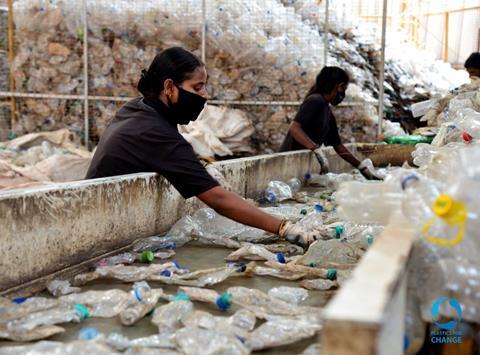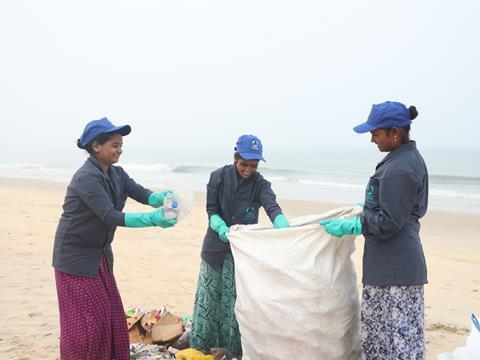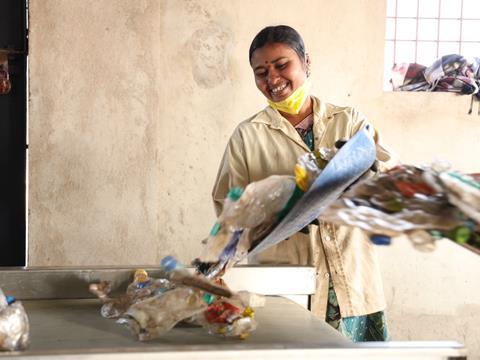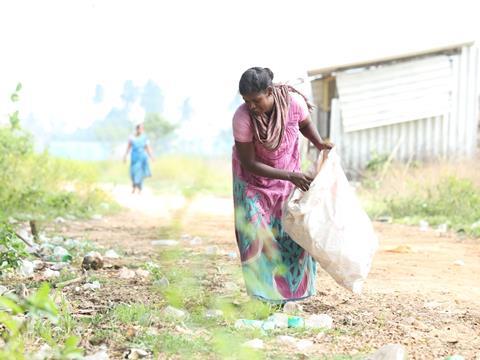
With around 2 billion people reportedly lacking access to formal waste management globally, plastic pollution is increasingly ending up in nature, especially in the Global South. And while the informal economy has stepped in to process plastic waste where governing bodies have failed, such systems can reinforce poverty and place people in unsafe work environments.
Plastics For Change is an organisation founded by Andrew Almack with the aim of addressing some of the challenges and opportunities presented by the informal waste economy in urban communities. By engaging informal waste collectors with traceability solutions, the organisation sets out to ascribe value to plastic waste, with the goal of facilitating higher collection rates and the ethical sourcing of plastics for recycling by international companies.
Andrew Almack, CEO and founder of Plastics For Change, discusses both the global and local significance of the informal waste economy and its potential to generate social and environmental change.
Can you introduce Plastics For Change, and tell us more about your ethical sourcing platform?
Plastics for Change is an on-the-ground organisation collecting plastic waste from the environment and engaging with a network of highly informal sectors to adopt best practices in collection. We currently have a network of over 1000+ scrap entrepreneurs and 5000+ waste collectors.
Plastics For Change has developed an ethical sourcing platform which creates transparency and accountability from the base of the supply chain to the manufacturer.
This impact is measurable and tangible in transforming lives through recycling. The impact benefits everyone in the supply chain – from waste collectors to scrap entrepreneurs to waste aggregation sites to recycling converters to manufacturers to brands that procure and finally to the store shelf.
In India, the informal and unorganised sector is responsible for 80-90% of recycling activities. The traditional informal recycling supply chain is a very exploitative system. This makes it high-risk for global brands to procure from such economies, resulting in the down-cycling of waste.
Waste collectors at the base of the supply chain face numerous challenges like unsafe working conditions, lack of social security or health insurance and are subject to fluctuations in the price of recyclables.
The informal recycling economy is also highly dysfunctional with inefficient supply chains. Therefore, it is difficult for the industry/brands to source consistent supplies of high-quality recycled plastic. Currently, 95% of the local manufacturers are sourcing purely virgin raw material.
We understand deeply the challenges in bringing behavioural change from the ground up. System change in circularity and solutions for plastic waste is not possible without keenly knowing the ground realities of ongoing collection systems.
The platform serves as a tool for ensuring that urban waste collectors receive a fair price for the discarded plastics they collect. We also offer a unique model which enables informal actors that remove plastic from the environment, to sell recyclable materials with increased access to global markets, adapt ethical practices, access technical opportunities and benefit from the new recycling economy.
Our ethical sourcing platform helps manufacturers make a profitable transition away from virgin plastic while creating sustainable livelihoods for the urban poor in developing countries. Through our in-house collection sites across south India, we’ve standardised audit-compliant processes to ensure a consistent supply of quality.
Through our technology platform, we are able to collect measurable and tangible data on the impact created on the planet and people through adapting fair trade principles in creating circularity. Over the last five years, our App has improved transparency, traceability, accountability and behaviour change in the collection systems in informal economies.

What is the process for certifying the plastics you source and supply as ‘fair trade’ or ‘ocean bound’?
Plastics For Change has adopted strategies from fair trade in agriculture and applied them to the informal recycling economy in India.
Waste collectors get all the information through Integrated Voice Response, while Brands and Franchise partners use the platform to do the buy-sell transaction, increasing the transparency of the whole supply chain. A team of field associates ensures the consistency and accuracy of the input data.
Through this technology, Plastics For Change has integrated a quarterly rating system on the app to incentivise scrap shops to adopt socially and environmentally responsible practices. Those adhering to the defined norms receive price incentives and preference in access to the supply chain of global markets
We work with two main third-party certification partners, the World Fair Trade Organization and the Ocean Bound Plastic certification scheme by ZPL. Our organisation was certified as WFTO and OBP after an intensive audit process.
This means that plastic certified as Fair Trade follows all 10 of the principles of fair trade, audited in our supply chain by the WFTO. Ocean Bound Plastic, in this context, means plastic originating from a coastal community at least 50km from the Ocean that has been audited by ZPL and Control Union.
How are the plastics you supply to manufacturers and brands used? Do you have any examples from brands you have worked with?
Plastics For Change has established plastic aggregation centres where the plastic is segregated to ensure consistent quality. Plastics For Change engages with brands and manufacturers to design a long-term project plan for reaching their recycling goals.
For example, if a brand needs 100 tonnes of HDPE, Plastics For change will reverse engineer the supply chain to ensure the consignments can be delivered on time and in full to the manufacturer. Designing the supply chain in advance increases efficiency and capitalises downtime at the processing facility.
The Body Shop and Plastics For Change collaborated over a 3 year period to develop and set up the world’s first fair trade supply chain for the collection of post-consumer plastic in India that provides steady income opportunities for thousands of marginalised waste-pickers.
In 2021, we impacted over 5000 direct beneficiaries at the base of the supply chain and helped 8 industry partners transition from virgin plastic to fair trade recycled plastic.

What is the significance of the informal waste economy in the global plastics supply chain?
Despite the significant volume processed by the informal economy, the overwhelming majority of waste collectors continue to operate informally and at a relatively small scale.
Waste collectors have the potential to act as environmental stewards by mitigating the effects of waste, contributing to the resilience of urban systems, reducing greenhouse gas (GHG) emissions through the recovery of materials from waste streams, and saving energy and preserving natural resources by enabling recycling and reuse.
Globally, around 2 billion people lack access to formal waste management systems. The informal sector, by definition, does not rely on any government funding to collect the waste. They are providing this service to society free of cost to municipalities and saving taxpayers millions in reduced waste management costs.
Around 60% of the plastic collected for recycling comes from the Global South. Emerging economies rely on an informal waste system because the formal waste collection system has not been established. For example, India produces more than 25,000 tonnes of plastic waste daily, nearly 40% of which is not collected and is littering the environment.
Last year, the world consumed over $500 billion worth of new fossil fuel-based plastics. This is ten times greater than the entire international aid budget of the EU. At Plastics For Change, we believe that plastic waste should be optimised as a resource for reducing poverty and creating dignified livelihoods.
Brands have a huge role to play in catalysing a movement towards more inclusive and socially responsible plastic supply chains. The good news is that there is now a very strong business case for taking action. Now more than ever, consumers want to purchase from brands that are taking bold steps to be sustainable and regulatory bodies are also enforcing a transition to a circular economy through taxes and EPR schemes.
Extended Producer Responsibility (EPR) schemes are being implemented in more and more places globally. What do you think the importance of these schemes are, and how is Plastics For Change supporting EPR?
The EPR legislation in India makes it mandatory for companies to establish a collect-back scheme for the plastic they produce. This means that it is the responsibility of the producer to ensure the products they produce will enter back into the Circular Economy.
Plastics For Change originally built our ethical sourcing platform with the goal of building human rights into the supply chain. This same system for supply chain transparency also serves as a tool for helping brands meet and exceed their EPR mandates.

Can you tell us more about the challenges and opportunities presented by the informal waste economy?
Informal recyclers are drawn from poor and vulnerable sectors of society; the low barriers to entry coupled with a ready income drives impoverished workers to waste picking. Waste collectors work in hazardous conditions and lack access to public services, healthcare, protective gear, and the proper tools that might otherwise improve productivity.
In addition, due to an absence of economies of scale, informal waste collectors have weak bargaining power in the recycling value chain. With poor opportunities and insufficient earnings, informal waste collectors are unrecognised and unprotected actors in the waste management system – despite their clear, critical role in the market.
The primary opportunity is to support their formalisation into a formal waste economy. The formalisation process recruits informal waste collectors and addresses personal, familial, health and other challenges workers face. The waste collectors have access to fair and just wages. As formal workers, they are able to access healthcare and social security as well as participate in vaccination programs run by government agencies.
There is also a unique opportunity to strengthen the financial inclusion of informal waste collectors, the majority of whom are unbanked and rely on cash transactions. Overcoming this challenge early, coupled with financial literacy training, can lead to improved management of personal finances including increases in savings and planning for future expenses for Members as well as improved financial management, capital accumulation, and expanded investments for the enterprises.














No comments yet